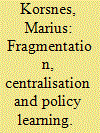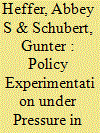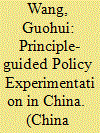|
|
|
Sort Order |
|
|
|
Items / Page
|
|
|
|
|
|
|
| Srl | Item |
| 1 |
ID:
134311


|
|
|
|
|
| Summary/Abstract |
This paper seeks to understand what government mechanisms have allowed China’s wind industry to grow as fast as it has over the past ten years. Instead of formal rules and regulations, this paper focuses on specific sets of institutional conditions that have been crucial in the process of high-speed implementation of wind energy in China. Specifically, fragmentation and centralisation, together with policy experimentation and policy learning, have been fundamental for policy flexibility and institutional adaptability. The paper illustrates that there are benefits and disadvantages to these characteristics, and that inherent qualities of China’s governing system that lead to rapid growth overlap with those that lead to challenges in terms of quality and long-term performance.
|
|
|
|
|
|
|
|
|
|
|
|
|
|
|
|
| 2 |
ID:
189025


|
|
|
|
|
| Summary/Abstract |
This article investigates the increasing development–security conflict in China’s immigration management through the case of a policy trial regularizing Vietnamese labour migration in two Guangxi border cities. China’s border regions host low-income immigrant labourers from neighbouring nations. In the 2010s, China launched a series of policy initiatives to regulate temporary and irregular migrant flows. Based on fieldwork and policy research, this study analyses the development and early implementation of this trial, with a focus on state perspectives. It shows how state actors mobilize migrant temporariness and other policy tools within a negotiation process that aims to resolve tensions between developmental policy aims for transnational economic integration and a drive towards securitizing cross-border mobility. I conclude that state actors fail to reach a balance between the conflicting development and security concerns. I also argue that China’s current risk-averse policy environment makes the development–security policy conflict in its immigration management more difficult to resolve. My findings contribute to our understanding of contemporary Chinese policymaking, including immigration policymaking, as well as to the literature on the development–security nexus in temporary labour management schemes.
|
|
|
|
|
|
|
|
|
|
|
|
|
|
|
|
| 3 |
ID:
171722


|
|
|
|
|
| Summary/Abstract |
The rural pension system, co-financed by rural residents' contributions and government subsidies, is a remarkable institutional innovation in China. To better understand the establishment and policy design of this system, this article studies the local experimentation of (partly) government-funded new rural pension schemes prior to the national policy guideline issued in 2009. The focus is on the role of social learning as a crucial driving force in this process. Through a process tracing based on in-depth interviews in Daxing of Beijing and Baoji of Shaanxi Province, this article illustrates how local governments struggled to find suitable financing models for rural pensions, and relied primarily on hands-on experimentation and experiences. During the mobilization of participation in the schemes, the repeated and constant interactions between local officials and rural residents promoted a form of mutual learning that contributed to local policy adaptation and rural residents' internalization of the value and basic rules of contributory pension provision. The local experience had a cumulative impact on the ideational reorientation of the central officials regarding the state's financial role in provision. Specifically, the financing model in Baoji created new options that facilitated the reconciliation of a set of different concerns and objectives at the centre, notably fiscal affordability, wide coverage, and modest managerial burden, which, this article argues, was the major reason for the incorporation of this model into the national policy. The article concludes by discussing the implications of the establishment of the rural pension system and its provisions on rural state-society relations in China.
|
|
|
|
|
|
|
|
|
|
|
|
|
|
|
|
| 4 |
ID:
124892


|
|
|
|
|
| Publication |
2013.
|
| Summary/Abstract |
Many studies raise doubts about the effectiveness of the institutions, programmes and instruments that shape the Chinese national innovation system. This article scrutinizes central-local interactions in the national Torch Programme that has governed a large group of high-technology zones since 1988. The Torch Programme's procedural practices challenge widely shared assumptions about the dirigiste character of Chinese innovation policy. It combines centralized definition of programme objectives with extensive local implementation experiments. As three case studies demonstrate, bottom-up policy innovations are effectively fed back into national programme adjustments and into horizontal policy diffusion. The array of organizational patterns and promotional instruments that emerges from competitive "experimentation under the shadow of hierarchy" (ESH) goes way beyond what could have been initiated from top down. We hypothesize that the procedural strengths displayed in the Torch Programme may provide better indicators of future innovative potential in China's high-technology zones than retrospective statistical indices and benchmarks that are derived from OECD experience.
|
|
|
|
|
|
|
|
|
|
|
|
|
|
|
|
| 5 |
ID:
119262


|
|
|
|
|
| Publication |
2013.
|
| Summary/Abstract |
As China has become the largest greenhouse gas (GHG) emitter in terms of total annual emissions, to promote GHG emissions reduction in China turns out to be crucial to the success of the global efforts to address climate change. This paper explores the development of the Chinese Domestic Voluntary Carbon Market (DVCM) in order to understand how carbon trading institutions have emerged and developed in China. To do this, it traces and analyzes the roles of the Chinese government and other key actors. Through process tracing and literature review, it argues that the pre-legislation and territorially fragmented development pattern of the Chinese DVCM has resulted from the activities of Chinese local governments and non-state actors under the policy experimentation approach adopted by the Chinese central government. It concludes with brief comments on the Chinese policy experimentation approach, and suggests that some measures can be taken to promote voluntary emissions reduction and policy learning.
|
|
|
|
|
|
|
|
|
|
|
|
|
|
|
|
| 6 |
ID:
190404


|
|
|
|
|
| Summary/Abstract |
Many studies put forward the argument that local policy experimentation, a key feature of China's policy process in the Hu Jintao era, has been paralysed by Xi Jinping's (re)centralization of political power – otherwise known as “top-level design.” This narrative suggests that local policymakers have become increasingly risk-averse owing to the anti-corruption campaign and are therefore unwilling to experiment. This article, however, argues that local governments are still expected to innovate with new policy solutions and now will be punished if they do not. By introducing the analytical framework of “experimentation under pressure” and drawing on an analysis of over 3,000 local government regulations and fieldwork data related to foreign investment attraction policies in two localities, Foshan and Ganzhou, the authors highlight new features developing within current experimental policy cycles. Local cadres now have no choice but to experiment as the political risk of shirking the direct command to experiment may be higher than the inherent risk of experimentation itself.
|
|
|
|
|
|
|
|
|
|
|
|
|
|
|
|
| 7 |
ID:
164411


|
|
|
|
|
| Summary/Abstract |
The abolition of Agricultural Tax in 2005 was a major policy of the early Hu–Wen administration. But how and why did it happen? Drawing on abundant media reports, archive documents and internal speeches by key policymakers, as well as on the author's interviews, this article argues that this reform was pushed through (the “how”) by “principle-guided policy experimentation” with origins in the period of Jiang Zemin's leadership. Not only does this show policy continuities from the Jiang–Zhu era into the Hu–Wen period, it also reveals a different process of policy experimentation from that identified by Sebastian Heilmann in the economic policy arena. Under principle-guided policy experimentation, Chinese central decision makers first reached consensus on the principle of the Rural Tax and Fee Reform (RTFR) drawing on policy learning from prior bottom-up local experimentation, and then formulated and implemented an experimental programme from the top-down, funding it in order to encourage local governments to participate. The evidence suggests that international, political (rural instability), economic and fiscal considerations came to explain leaders’ decisions (the “why”) on tax reform as much as their individual preferences.
|
|
|
|
|
|
|
|
|
|
|
|
|
|
|
|
| 8 |
ID:
189505


|
|
|
|
|
| Summary/Abstract |
Traditional analysis of China's policy experimentation has focused on the role of central–local relations and rotating leaders in shaping the local agenda-setting process. Less is known about the role of less mobile mid-level local bureaucrats who serve as bridges in the implementation process. This paper examines why some cities have performed better than others at implementing and maintaining low-carbon policy experiments. Drawing on a comparison of four case cities and over 100 expert interviews, I argue that the availability of bureaucratic entrepreneurs and their resource mobilization capacity determine the level of local engagement in climate policy experimentation. This study shows that the institutionalization of local policy experiments is not only driven by the central government or rotating top local leaders but also by bureaucratic entrepreneurs who help policy experiments survive periodic changes in the bureaucracy. The findings have important implications for the fulfilment of China's 2060 carbon neutrality pledge.
|
|
|
|
|
|
|
|
|
|
|
|
|
|
|
|
|
|
|
|
|